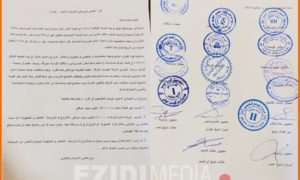—-The Sentence:
——————
There are four kinds of sentences in Kurmanji:
1-Declarative or Assertive Sentence: is a sentence that makes a statement or assertions; as,
I am eating the meal = Ez ye^ nan y di xuom
2-Interrogative Sentence: is a sentence that asks a question; as,
Where do you live = Tu li ke^re^ di jy?
3-Imperative Sentence: is that which expresses a command or an entreaty; as,
Eat the bread = Tu nan y bi xuo
4-Exclamatory Sentence: is that which expresses strong feeling; as,
How very tired I feel! = Ez c,end ye^ mandy(ke^fila) me!
— Subject:
————
In Kurmanji, the subject comes first, but occasionally it is put after the predicate to emphasize the later; as,
I am ill = Ez ye^ nexas, im.
I ate the meal = Min nan xuard
The subject may left be out sometimes.
(You) eat the meal = (Tu) nan y bi xuo
— The Phrase and the clause:
——————————
The phrase: a group of words which make sense, but not complete sense as the sentence does; as,
The sun sets in the west = Roj ava di bi^t li Ro-ava (ava)’e^
‘in the west’ = ‘li Ro-ava’e^’ is a phrase.
The clause: is a group of words which contains a subject, and a predicate; as,
I think that you have broken a promise
= Pi min were, kue te jivan yek ye^ bizdandy.
— Parts of Speech:
——————-
* Noun : Nav
Michael is a good boy = Mi^kae^l kurh yek ye^ bas, e
* Adjective : Renge^r; S,i^ve; Awa
He is a good boy = Ew kurh yek ye^ bas, e
* Pronoun : Bonav; Pronav; Bernav
Zaradasht is not here, because he is ill
= Zerdes,t live^re ny’e, c,unky ew ye^ nexas, e
* Verb : Le^ker; Kirdin; Kiryar
Norwich is a a fine city = Norwich baje^r yeke^ cuan e
* Adverb : Te^debu^on; Peskin; Hoker
I came down quickly = Ez hatim bi lez
* Preposition : Dac,ek; Pe^c,i^n
There is a dog in the garden = Seg yeke^ li nav rez y
* Conjuction : Te^gir; Gihanek; Nu^sek
Muhammad and Zara are brothers = Memed u Zara bira ne
* Interjection : Demary; Banes,an
Hurrah! I have won the game = Hey! Mingeme ya birdy

You must be logged in to post a comment Login
Leave a Reply
Для отправки комментария вам необходимо авторизоваться.










